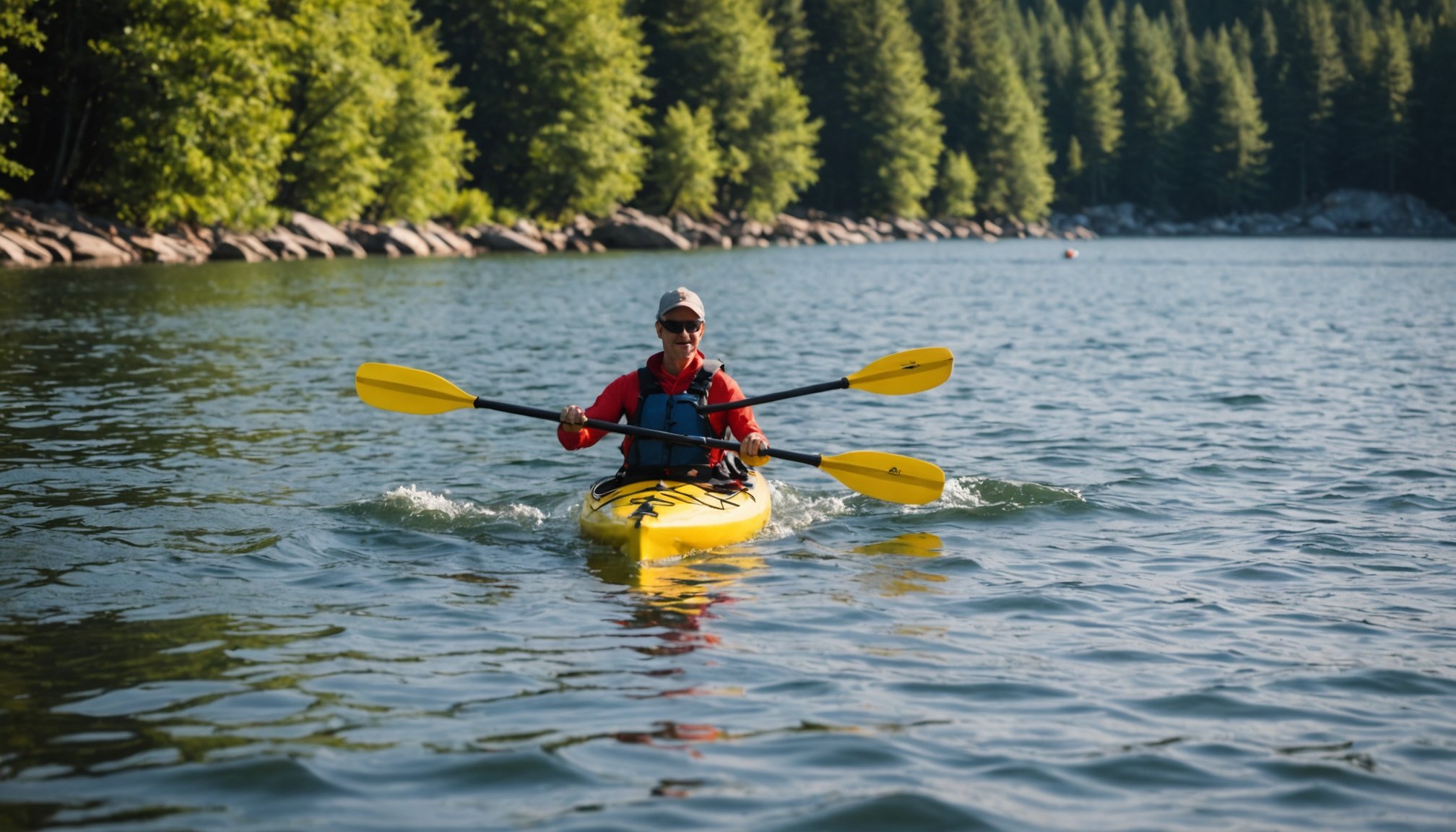Unlocking Mental Wellness: The Surprising Psychological Advantages of Consistent Kayaking
In a world where mental health is increasingly at the forefront of our conversations, it’s essential to explore activities that not only promote physical well-being but also have a profound impact on our mental health. One such activity that has garnered significant attention in recent years is kayaking. This article delves into the psychological advantages of consistent kayaking, highlighting how this water-based sport can transform your mental wellness.
The Therapeutic Effects of Being Near Water
Being near water has long been recognized for its therapeutic benefits. The concept of “blue space” – areas where people can be in or near natural water environments – has been studied extensively for its positive effects on mental health.
Also to see : Enhancing Mental Toughness: Key Psychological Strategies for Building Resilience in Professional Judo Athletes
The Calming Influence of Water
Water has a unique ability to calm the mind and reduce stress levels. A study on the effects of virtual kayak paddling exercise noted that activities involving water can significantly improve postural balance and reduce symptoms of mental health conditions such as depression and anxiety.
“When you’re out on the water, you feel a sense of calm and tranquility that’s hard to find in other environments,” says Jo Moseley, an advocate for stand-up paddle boarding and its health benefits. “The rhythmic motion of paddling and the sound of the water create a meditative experience that helps clear your mind and reduce stress.”
Topic to read : Top Warm-Up Routines to Elevate Your Competitive Dance Performance
Stress Reduction and Mood Enhancement
Kayaking is more than just a physical activity; it’s a mental health booster. Here are some ways kayaking can help reduce stress and enhance your mood:
Physical Activity and Endorphins
Physical activity is a well-known stress reducer, and kayaking is no exception. The physical exertion involved in paddling releases endorphins, which are natural mood elevators. “When you’re kayaking, you’re not just working your body; you’re also stimulating your mind. The release of endorphins makes you feel more alert and focused,” explains a recreational therapist at Ozarks Teen Challenge.
Breathing Exercises and Mindfulness
Kayaking often involves deep, rhythmic breathing, which can be likened to mindfulness exercises. This type of breathing helps regulate the vagus nerve, a key component in managing stress and promoting relaxation.
“Kayaking forces you to be present in the moment. You can’t worry about yesterday or tomorrow when you’re navigating through choppy waters. This mindfulness aspect is incredibly beneficial for mental health,” notes a kayaking enthusiast.
Social Benefits and Community Connection
While kayaking can be a solo activity, it also offers numerous social benefits that are crucial for mental wellness.
Building Community and Social Connections
Joining a kayaking group or club can provide a sense of community and social connection, which is vital for mental health. Social media platforms often highlight the importance of social connections, but nothing beats the real-life interactions and camaraderie that come with shared activities like kayaking.
“Being part of a kayaking community has been a game-changer for me. It’s not just about the activity itself; it’s about the people you meet and the friendships you form,” says a member of a local kayaking club.
Cognitive Function and Long-Term Health Benefits
Kayaking is not just beneficial for immediate mental health; it also has long-term cognitive and health benefits.
Cognitive Function Improvement
Engaging in outdoor activities like kayaking can improve cognitive function by challenging the brain in new ways. The strategic thinking required to navigate through waters and the constant need to adapt to changing conditions keep the mind sharp.
“Kayaking is like a puzzle. You have to think ahead, anticipate obstacles, and adjust your strategy on the fly. This mental stimulation is excellent for keeping your cognitive functions in top shape,” explains a cognitive psychologist.
Long-Term Health Benefits
The health benefits of kayaking extend far beyond the immediate mental health advantages. Regular kayaking can help lower blood pressure, improve cardiovascular health, and even reduce the risk of chronic diseases.
Here is a comparative table highlighting some of the long-term health benefits of kayaking:
| Health Benefit | Description |
|---|---|
| Blood Pressure Reduction | Regular physical activity like kayaking can help lower blood pressure and reduce the risk of heart disease. |
| Cardiovascular Health | Kayaking improves cardiovascular circulation, which is crucial for overall heart health. |
| Chronic Disease Prevention | The physical exertion and stress reduction associated with kayaking can help prevent chronic diseases such as diabetes and certain types of cancer. |
| Mental Health Stability | Consistent kayaking can help stabilize mental health by reducing symptoms of depression and anxiety. |
| Improved Sleep | The physical and mental exhaustion from kayaking can lead to better sleep quality, which is essential for overall health. |
Cold Water Immersion and Resilience
For those who venture into colder waters, there are additional benefits that come with cold water immersion.
Cold Water and Mental Resilience
Cold water exposure has been shown to increase resilience and grit. According to Professor Andrew Huberman, deliberate cold exposure can train the prefrontal cortex, helping individuals cope better with real-world stressors.
“Immersion in cold water is like a wake-up call for your body and mind. It forces you to be resilient and adapt quickly to new conditions,” says a sea kayaker who frequently paddles in cold waters.
Practical Insights and Actionable Advice
If you’re considering taking up kayaking for its mental health benefits, here are some practical insights and actionable advice to get you started:
Start Small
- Begin with short trips and gradually increase your paddling time as you build endurance.
- Choose calm waters to start with, such as lakes or slow-moving rivers.
Invest in Proper Gear
- Ensure you have a well-fitting kayak and the necessary safety gear, including a life jacket.
- Consider investing in a paddle that suits your height and paddling style.
Find a Community
- Join local kayaking clubs or groups to connect with other kayakers.
- Participate in guided tours or workshops to learn new skills and gain confidence.
Practice Mindfulness
- Focus on your breathing and the surroundings while paddling.
- Take breaks to appreciate the natural beauty around you.
Here is a detailed list of tips for getting started with kayaking:
- Choose the Right Kayak: Select a kayak that is stable and easy to maneuver, especially if you’re a beginner.
- Learn Basic Paddling Techniques: Understand how to hold the paddle, how to stroke, and how to turn the kayak.
- Practice Safety: Always wear a life jacket and know basic safety procedures such as self-rescue techniques.
- Start on Calm Waters: Begin with calm waters to build confidence before moving to more challenging conditions.
- Stay Hydrated and Energized: Bring water and snacks to keep your energy levels up during long paddling sessions.
- Respect Nature: Follow environmental guidelines and respect the natural habitats you paddle through.
Kayaking is more than just a recreational activity; it’s a powerful tool for enhancing mental wellness. From the therapeutic effects of being near water to the long-term health benefits and social connections, kayaking offers a holistic approach to mental health.
As you embark on this new journey, remember that every paddle stroke is not just a physical movement but a step towards better mental health. So, grab your paddle, hit the water, and experience the transformative power of kayaking for yourself.











